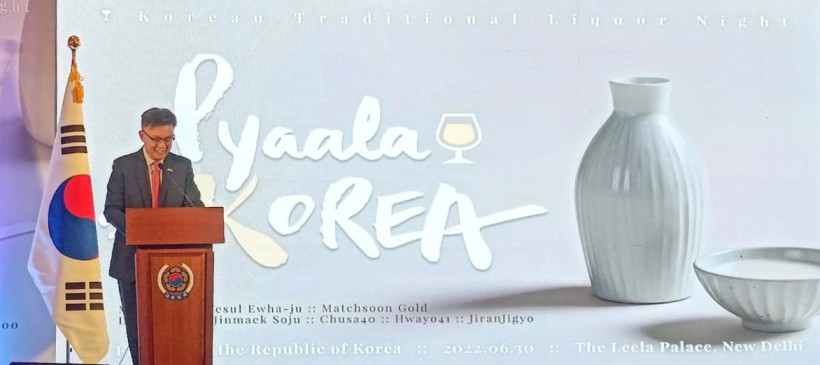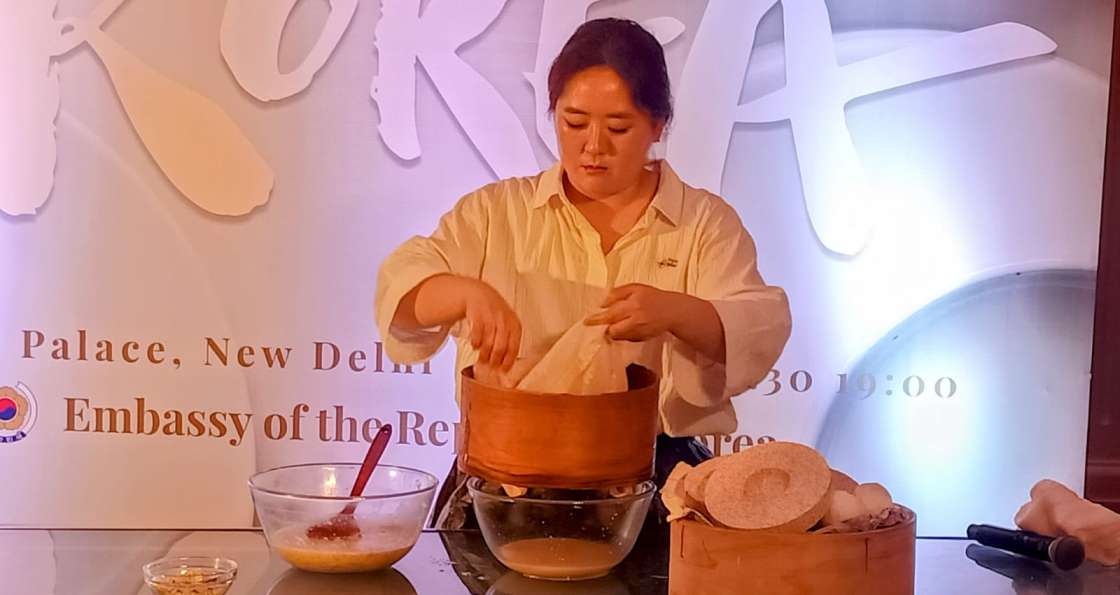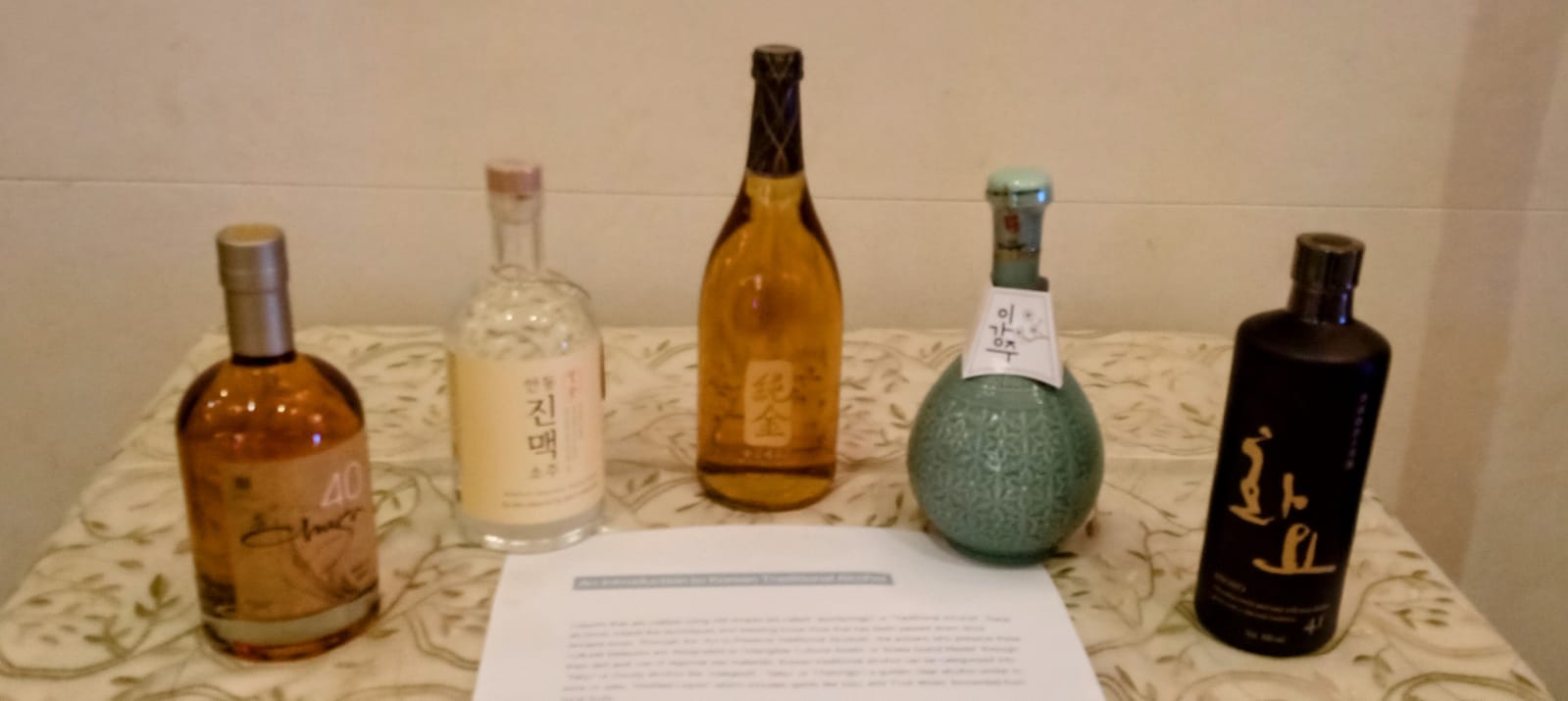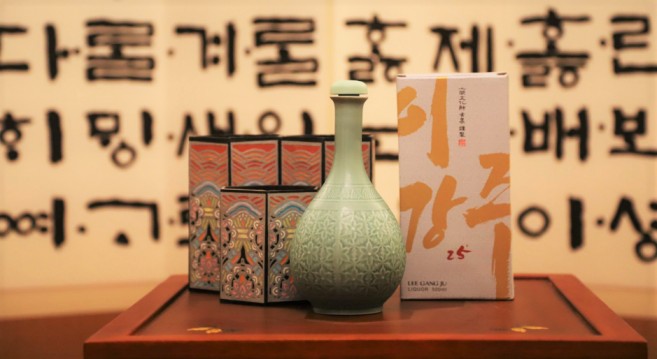Welcome K-Sool: Korean traditional liquors Takju, Yakju, Soju, fruit wines make debut in India
Takju is a cloudy alcohol like 'makgeolli', Yakju or Cheongju a golden clear alcohol similar to wine or sake, Distilled Liquor includes spirits like Soju, and Fruit Wines are fermented from local fruits.
NEW DELHI: After the Korean wave Hallyu involving K-Pop, K-Drama, and K-Food swept India, it’s time for Korean Sool (alcohol) – the Korean liquors and wines made of rice and fruits to grip India with the fever of its great taste, and nutritional values.
Rich in flavour, the soothing and supple Korean traditional alcoholic beverages have made a silent but impactful entry into India.
Recently the Embassy of the Republic of Korea in New Delhi organised a Korean traditional liquor promotional event – Pyaala (bowl) of Korea, and invited Indian people and dignitaries from various embassies to experience the taste of the freshly brewed Korean Sool (liquors).

Chang Jae-bok, Ambassador, Republic of Korea said, “Indian people already know about a popular Korean drink called Soju but now we are going to introduce to them a wide range of traditional Korea liquors that are brewed in Korea by the master brewers. I am sure that these traditional liquors will go very well with traditionsl Indian cuisines too. This event would spark a new interest of the Indian people in Korea’s rich brewing culture and cement our friendship with Pyaala of Korea.”
The Korean traditional liquor tasting session was held on the side lines of the Korean Food Festival 2022 that the Embassy organised June 25-July 3, to introduce Korean food and beverages to the Indian people.
Ms. Nara Yun, Korean wine brewer and trainer especially flew in straight from Seoul to New Delhi not only to explain and make the attendees aware of the wide range of Korean liquors but also made a live demonstration of brewing fermented rice wine Yakju. Korean food was also served on this occasion.

While explaining about various variant of Korean liquor, Ms. Yun said, “Liquors that are crafted using old recipes are called ‘Jeonteongju’ or ‘Traditional Alcohol’. These alcohols inherit the techniques and brewing know-how that has been passed down since ancient times. Through the ‘Act to Preserve Traditional Alcohols’, the artisans who preserve these cultural treasures are designated as ‘Intangible Cultural Assets’ or ‘Korea Grand Master’ through their skill and use of regional raw materials.”
Korean traditional alcohol can be categorized into ‘Takju-a cloudy alcohol like ‘makgeolli’, ‘Yakju’ or ‘Cheongju’-a golden clear alcohol similar to wine or sake, ‘Distilled Liquor’ which includes spirits like soju, and ‘Fruit Wines’ fermented from local fruits.

Takju (Makgeolli) with 8-12% alcohol:
Alcohols that are brewed using grains such as rice or barley and use fermentation starters including nuruk, koji or yeast are called ‘Takju’. The word ‘Tak’ means ‘Cloudy’, any fermented alcohol with sediment is called ‘Takju”. The word ‘Makgeolli’ means ‘Freshly filtered’, and makgeolli is a form of Takju.
Yakju/Cheongju with 12-15% alcohol:
Using the same brewing techniques as ‘Takju’, ‘Yakju’ or ‘Cheongju’ is the golden clear liquor that separates from the sediment layer during fermentation or filtration. Yakju or Cheongju can be produced from a variety of grains or fermentation starters, the defining characteristic being its clarity and fragrance.
Distilled Liquor: Soju with 45-50% alcohol
When fermented alcohols such as Takju, Yakju or Cheongju are distilled, they can be classified as Distilled Liquor. There are many categories of distilled liquors such as soju, liqueurs and general distilled alcohols, but of course the most representative for Korean traditional alcohol is Soju. ‘So’ means to burn, and ‘Soju’ comes to represent the distilled spirit from the process of heating fermented rice based alcohols.
Fruit wines with 20-25% alcohol:
Fruit wines are fermented from regional fruits that are unique to the area.Grapes, wild berries, apples, peaches, plums, and strawberries are used in the many varieties of Korean fruit wines.
Yesul:
While explaining about Yesul Ewhaju, a variant Takju, Ms. Yun said, “Yesul means ‘work of art’ and sul means alcohol. Yesul brewery is trying to create work of art by making finest Korean liquor. Made with powdered rice and pine leaves, Ewhaju was premium ‘Takju’ for the riches. With balanced sweetness and tropical aroma it could be served as an appetizer or a dessert and also could be used as a sauce in a dish. Ewha is a pear flower, although Ewhaju isn’t made with the flowers but it’s made during spring when pear flowers blossom.”
Ms. Yun runs two restaurants in Yunjudang in Seoul where traditional Korean food and freshly brewed drinks are served. On Weekends, she also teaching the Korean traditional liquor brewing techniques to the liquor enthusiasts and bartenders there.
The next city where she is going to make demonstration of Korean traditional liquor is New York.



